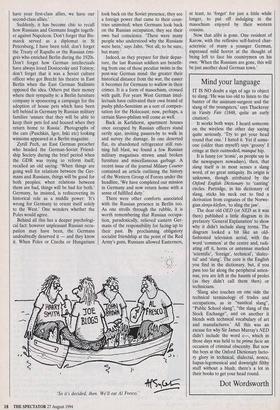Mind your language
IT IS NO doubt a sign of age to object to slang. 'He was too old to listen to the banter of the assistant-surgeon and the slang of the youngsters,' says Thackeray in Vanity Fair (1848, quite an early citation).
It works both ways. I heard someone on the wireless the other day saying quite seriously, 'Try to get your head round that one.' I hated it. Yet if some- one (older than myself) says 'groovy' I cringe at their outmoded, manqué hip.
It is funny (or 'ironic', as people say in the newspapers nowadays), then, that slang itself is in most senses a slang word, of no great antiquity. Its origin is unknown, though attributed by the Oxford English Dictionary to 'canting' circles. Partridge, in his dictionary of slang, sticks his neck out to find a derivation from cognates of the Norwe- gian slenja-kleften, 'to sling the jaw'.
The dear old OED (or NED as it was then) published a little diagram in its prefatory 'General Explanation' to show why it didn't include slang terms. The diagram looked a bit like an old- fashioned television aerial, with the word 'common' at the centre and, radi- ating off it, horns or antennae marked `scientific', 'foreign', technical', 'dialec- tal' and 'slang'. The core is the English you find in the dictionary, but, if you pass too far along the peripheral anten- nae, you are left in the haunts of proles (as they didn't call them then) or technicians.
`Slang also touches on one side the technical terminology of trades and occupations, as in "nautical slang", "Public School slang", "the slang of the Stock Exchange", and on another it blends with technical vocabulary of art and manufactures.' All this was an excuse for why Sir James Murray's NED didn't include the word c—, which in those days was held to be prima facie an occasion of criminal obscenity. But now the boys at the Oxford Dictionary facto- ry glory in technical, dialectal, nonce, hapax-legomenical and downright filthy stuff without a blush; there's a lot in their books to get your head round.
Dot Wordsworth


























































 Previous page
Previous page